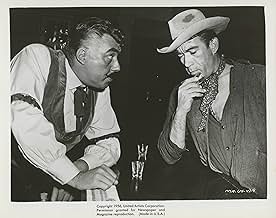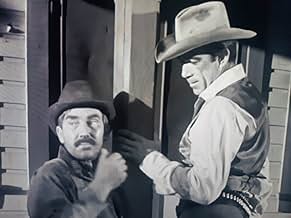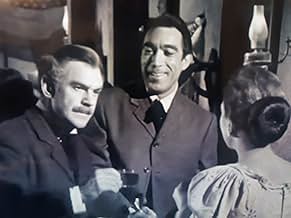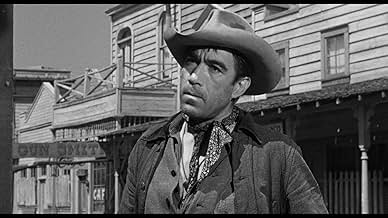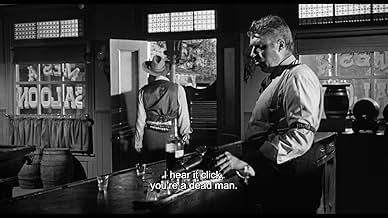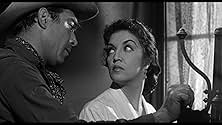Ajouter une intrigue dans votre langueA fast Mexican-American gunman kills a few notorious gunfighters and is hired to replace Mesa's dead sheriff but a crooked saloon-keeper wants him on his payroll or out-of-the-way.A fast Mexican-American gunman kills a few notorious gunfighters and is hired to replace Mesa's dead sheriff but a crooked saloon-keeper wants him on his payroll or out-of-the-way.A fast Mexican-American gunman kills a few notorious gunfighters and is hired to replace Mesa's dead sheriff but a crooked saloon-keeper wants him on his payroll or out-of-the-way.
Barry Atwater
- Dan Ritchy
- (non crédité)
Nora Bush
- Townswoman
- (non crédité)
Bill Clark
- Townsman
- (non crédité)
Katherine DeMille
- Woman
- (non crédité)
Bill Erwin
- Roy Higgens
- (non crédité)
Marc Hamilton
- George Dawson
- (non crédité)
Paul Harber
- Mr. Brown
- (non crédité)
Jack Hogan
- Westin
- (non crédité)
Adrienne Marden
- Mrs. Tillman
- (non crédité)
Jimmy Noel
- Townsman
- (non crédité)
Fox O'Callahan
- Townsman
- (non crédité)
Avis à la une
Anthony Quinn always made it look easy and that was one of his strengths as a actor, this movie would have been good with another leading man too, because the supporting actors were top notch, but Tony definitely pulled it up a peg or two!
That gunfight in the beginning was kind of funny though, surprised Dan Ritchie lived so long with that draw of his!
That gunfight in the beginning was kind of funny though, surprised Dan Ritchie lived so long with that draw of his!
A Mexican gunfighter is hired as the sheriff of a town which the local saloon owner intends to turn into a haven for gunslingers and outlaws. A dark, brooding Western which makes no effort to make a hero of its lead character and features a gritty performance from Quinn who, although believed by many to be Greek was actually born in Chihuahua, Mexico. Peter Whitney, a great heavy of the 40s and 50s, impresses as the initially friendly bar owner who hopes to have Quinn on his side. Some powerful individual scenes, and a strong, often overlooked Western Noir
Man From Del Rio (1956) is one of a large number of well directed, nicely written and acted westerns from the 50s, a decade rich in quality westerns, from the small scale, epic and everything in-between. The film's director, Harry Horner, was an old Hollywood hand, used some odd camera angles and made the visual and spatial aspects of this modest production interesting, pleasing to look at, even as the film is itself low budget and in black and white.
Anthony Quinn is the Hispanic sheriff of a small western town where he is needed, due to his skill with handguns, but not liked or wanted due to his ethnic background. Even Katy Jurado's token Hispanic woman, playing somewhat against type, would rather Quinn would simply disappear. The supporting cast is outstanding for a film of this sort, with such familiar players as Whit Bissell and Douglas Fowley in roles in which each would seem be a better fit for the the other's.
It helps to be a western fan to enjoy this picture. This is not a movie for everyone. The story itself is by the numbers, but it works some nice variations on its familiar themes; and star Anthony Quinn is excellent in the lead. He was on the verge of major stardom when he appeared in the film, and on the basis of his performance it's easy to see why. The film was released the same year as Lust For Life, in which Quinn's supporting performance won him an Academy award. It's difficult for me to imagine two more different films for this actor to have appeared in during the same year.
Anthony Quinn is the Hispanic sheriff of a small western town where he is needed, due to his skill with handguns, but not liked or wanted due to his ethnic background. Even Katy Jurado's token Hispanic woman, playing somewhat against type, would rather Quinn would simply disappear. The supporting cast is outstanding for a film of this sort, with such familiar players as Whit Bissell and Douglas Fowley in roles in which each would seem be a better fit for the the other's.
It helps to be a western fan to enjoy this picture. This is not a movie for everyone. The story itself is by the numbers, but it works some nice variations on its familiar themes; and star Anthony Quinn is excellent in the lead. He was on the verge of major stardom when he appeared in the film, and on the basis of his performance it's easy to see why. The film was released the same year as Lust For Life, in which Quinn's supporting performance won him an Academy award. It's difficult for me to imagine two more different films for this actor to have appeared in during the same year.
An easy role for Anthony Quinn who plays himself, which does not mean that he's bad, on the contrary, because of his strong personality, without too much effort, outlines a credible character. Mexican Katy Jurado, who also starred with Anthony Quinn in "Barabbas" plus other famous westerns ("High Noon" with Gary Cooper, "Broken Lance" with Spencer Tracy, "One-Eyed Jacks" with Marlon Brando, "Pat Garrett & Billy the Kid " with James Coburn and Kris Kristofferson) is also credible in the role of Estella. A western without too many gun-shots, but with more realism.
Ah, the good old days, when a slap in the face meant a man loved you. In Man from Del Rio, that's what it meant to Anthony Quinn and Katy Jurado. Believe me, the movie is much more than that, but that scene was pretty amusing.
Anthony Quinn stars a half-Mexican from the wrong side of the tracks who isn't really welcomed by the small town he wanders into-in other words, this is a typical Anthony Quinn role. It's a pretty mediocre 1950s western, which is a genre I don't really like, and if it weren't for Tony's good looks-and good performance-I probably would have turned it off. Thankfully he was good looking, and he did add nuances to his character that made him likable and easy to root for, despite slapping Katy Jurado, so I watched the whole movie.
Another actor could have rattled off his lines with no feeling, like much of the supporting cast, but Tony decided to give his character motivation and feelings. His main issue revolves around pride: he's ashamed that the town doesn't accept him and he wants to be able to hold his head up high. So, whenever he's challenged to a fight, he can't back down. I'm pretty sure it was Anthony Quinn who made those motivations clear. As you might expect from a movie taking place in the Old West, there are lots of shootouts, slugfests, barroom brawls, and lawless mobs. If you like that genre, you'll probably like this movie. I won't spoil anything, but Richard Carr's story grew to be pretty imaginative, and I ended up liking Man from Del Rio much more than I thought.
Anthony Quinn stars a half-Mexican from the wrong side of the tracks who isn't really welcomed by the small town he wanders into-in other words, this is a typical Anthony Quinn role. It's a pretty mediocre 1950s western, which is a genre I don't really like, and if it weren't for Tony's good looks-and good performance-I probably would have turned it off. Thankfully he was good looking, and he did add nuances to his character that made him likable and easy to root for, despite slapping Katy Jurado, so I watched the whole movie.
Another actor could have rattled off his lines with no feeling, like much of the supporting cast, but Tony decided to give his character motivation and feelings. His main issue revolves around pride: he's ashamed that the town doesn't accept him and he wants to be able to hold his head up high. So, whenever he's challenged to a fight, he can't back down. I'm pretty sure it was Anthony Quinn who made those motivations clear. As you might expect from a movie taking place in the Old West, there are lots of shootouts, slugfests, barroom brawls, and lawless mobs. If you like that genre, you'll probably like this movie. I won't spoil anything, but Richard Carr's story grew to be pretty imaginative, and I ended up liking Man from Del Rio much more than I thought.
Le saviez-vous
- AnecdotesFinal film of Katherine DeMille (uncredited), who was married to Anthony Quinn; they divorced in 1965.
- GaffesThe player piano in the saloon plays "Lili Marleen." That song wasn't written until 1937.
- Crédits fousAlthough Guinn "Big Boy" Williams is billed on the one-sheet, he is inexplicably uncredited in the film itself.
Meilleurs choix
Connectez-vous pour évaluer et suivre la liste de favoris afin de recevoir des recommandations personnalisées
Détails
- Date de sortie
- Pays d’origine
- Langue
- Aussi connu sous le nom de
- Man from Del Rio
- Lieux de tournage
- Société de production
- Voir plus de crédits d'entreprise sur IMDbPro
- Durée
- 1h 22min(82 min)
- Couleur
- Rapport de forme
- 1.85 : 1
Contribuer à cette page
Suggérer une modification ou ajouter du contenu manquant

